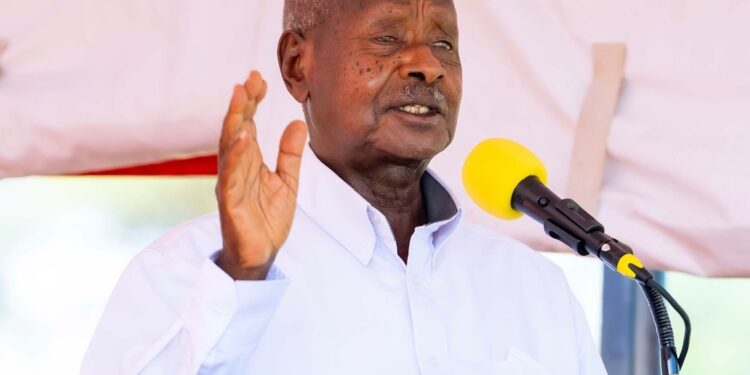President Yoweri Kaguta Museveni marked International Anti-Corruption Day with a resounding call for youth involvement in eradicating corruption, emphasising their pivotal role in shaping a future rooted in integrity. Addressing attendees under the theme, “Promoting Effective Participation of the Youth in the War Against Corruption,” the President outlined Uganda’s achievements and ongoing commitments to combat corruption.
Museveni, whose speech was delivered by Prime Minister Robinah Nabanja during the commemorating the International Anti-Corruption Day 2024 at Speke Resort Munyonyo, on Tuesday, traced Uganda’s anti-corruption efforts back to the Bush War and the National Resistance Movement’s Ten-Point Programme, where accountability and integrity were cornerstone principles. “Point Number 7 of our programme identified corruption as a critical barrier to national development and good governance,” he stated, reiterating the government’s Zero Tolerance policy embedded in the NRM Manifesto 2021-2026.
The President highlighted Uganda’s progress in strengthening its legal and institutional frameworks, including ratifying key international conventions. However, he warned that corruption significantly threatens achieving Vision 2040 and the Sustainable Development Goals (SDGs). “Despite our natural resources, educated youth, and strategic location, corruption undermines these advantages and hinders development,” Museveni said.
Museveni appealed for unity among all stakeholders, urging the private sector, civil society, religious leaders, and the media to join the anti-corruption campaign. He encouraged citizens to report corruption cases, noting that high awareness must translate into actionable efforts. “Individual inaction will result in collective failure. Demand accountability and report incidences to Anti-Corruption Agencies,” he implored.
He further directed anti-corruption agencies to map high-risk public services and identify areas that are prone to unethical practices. Proposals included digitizing service delivery to reduce face-to-face interactions, strengthening audits, and involving communities in monitoring government projects like the Parish Development Model.
On the other hand, he lauded the efforts of Anti-Corruption Agencies, acknowledging their high-risk work environment. “Your perseverance and commitment to a corruption-free society are commendable. The government stands firmly with you,” he affirmed.
“Let us build a society where corruption is not tolerated, and everyone has access to opportunities,” he said.
On the same note Beti Kamya Turwomwe the Inspector General of Government, revealed that corruption is rooted in the traditional faces of corruption like bribery, embezzlement, falsification of accountability documents, procurement malpractices, tax evasions through under declaration and non-declaration of taxable business, ghost employees and ghost facilities, absenteeism, inflation of payrolls, HR management malpractices, environmental degradation etc, which is estimated to cost about UGX 10T per year, which we have been spreading around, through the recent joint ACAs brainstorm session.
“We learnt that there is actually very big corruption out there, often not talked about, but through which a lot more money is stolen from Uganda, such as Cybercrime and trans-national fraud. Financial institutions are defrauded of hundreds of billions of shillings, usually channelled through government systems and processes, aided by government officials. The recent syphoning of UGX 60B from BOU is a typical example of a common occurrence in most financial institutions in Uganda today,” she said.
Kamya also revealed that impersonation of top government officials to cone potential investors to Uganda is highly prevalent. “There’s a powerful syndicate that includes government officials. Conmen lure investors to Uganda, masquerading as senior government officials, the investors are received with full government splendour, including police escorts and lead cars, driven in posh vehicles, flying the national flag, with government number plates, they are led to government boardrooms where they meet “top government officials”, transact business and by the time the investor get wise, they’ve been fleeced of millions of dollars.”
She noted that these fraudsters quickly launder the money by buying property in Uganda or abroad. When they disagree on sharing the proceeds of crime, the aggrieved party whistleblow to one of the ACA. Such crimes are extensive in nature, often involving several jurisdictions and require a lot of resources to monitor and investigate.
“One might think that coning a prospective investor does not hurt us but it does because that money fleeced from investors would been intended to build a factory here, employ Ugandans, pay taxes and attract other investors. Corruption in the private sector also hurts the whole country because it makes Uganda an expensive economy in which to do business. After all, the cost of corruption ends up in the price and quality of goods and services which makes Uganda a less competitive market,” she said.
According to Kamya, the HR manager in the private sector, the procurement officer in the private sector, and the storekeeper in the private sector are all as corrupt as their counterparts in the government and it also impacts the economy, which means that the cost of corruption is much higher than the UGX 10T per year yet the recent reports on corruption cybercrime, impersonation, investor coning and corruption in the private sector were not factored in the research that came up with UGX 10T as the cost of corruption.
“We need to mobilize resources for another research on the comprehensive cost of corruption in Uganda. Each of these ACAs has a role to play in ensuring accountability and transparency but we are all under-resourced. If ACAs are to stop even a small fraction of the haemorrhage of public resources, the government must seriously consider adequately resourcing them,” she said.
Kamya alluded that the prevalence of corruption is much bigger than the government and those agencies put in place to fight it, ordinarily envisaged, it is much bigger than the UGX 10T per year that Uganda has been decrying.
“Uganda is bleeding profusely, we must do whatever it takes to stop, or at least contain the haemorrhage otherwise the patient could become seriously anaemic, and of course, this would have dire consequences. This is the message we ask you to take back to H.E. and to Cabinet.”
Do you have a story in your community or an opinion to share with us: Email us at editorial@watchdoguganda.com













